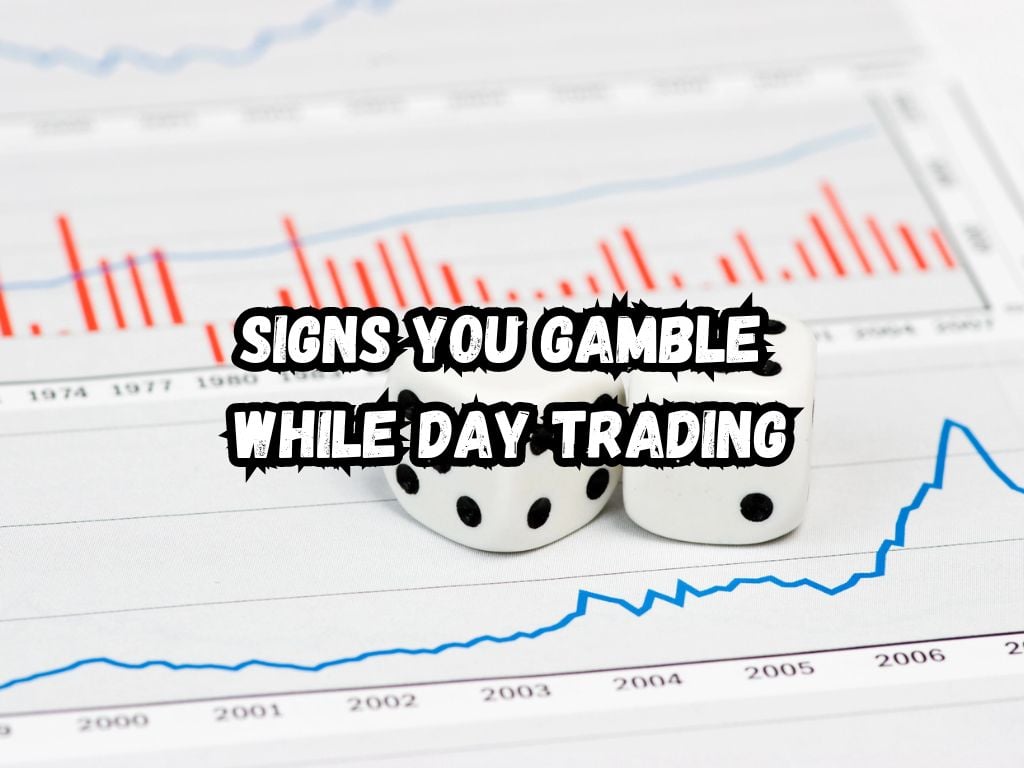Day trading and gambling might seem similar to the untrained eye, both involving significant risk and decision-making under uncertainty. However, it’s critical for anyone participating in the financial markets to understand the stark differences between the two.
Identifying whether you’re investing or actually gambling with your trades is crucial for your long-term success and financial health. Let’s learn about the signs you gamble while day trading.
What is Day Trading?
Day trading involves buying and selling securities within the same trading day. Traders capitalize on small price movements and use leverage to amplify their gains.
Common strategies under this umbrella include scalping, where traders aim for small profits in short time frames, and momentum trading which involves trading on news releases or finding strong trending moves supported by high volume.
What is Gambling?
Gambling is betting money on an outcome that is largely dependent on chance. While it can provide a thrill and occasional rewards, it lacks the consistency and strategy associated with investing.
In contrast, successful trading involves a methodical approach, prioritizing analysis, forecasts, and strategic planning.

Signs You Gamble While Day Trading
Lack of a Trading Plan
Trading without a plan is akin to sailing without a map. Successful traders operate according to a well-defined trading plan that includes detailed entry, exit, and money management criteria.
Without these components, trading decisions may become random and emotion-driven, tarnishing the line between trading and gambling.
Ignoring Risk Management
Risk management is crucial when trading in the stock market. A disciplined trader sets stop-loss orders to limit potential losses and uses position sizing to adjust the volume of stocks taken in a trade.
Skirting these practices can result in significant and unnecessary financial exposures, echoing gambling behaviors.
Over-Reliance on ‘Hunches’ or Emotions
Trading based on emotions or gut feelings is a significant indicator of gambling. Unlike strategic trading decisions backed by research and data, emotional decisions do not consistently yield profit. They often reflect an impulsive, gamble-like approach.
Chasing Losses
One clear sign of gambling in trading activities is when a trader tries to recover losses quickly by entering further risky trades. This behavior is precarious and can lead to further deficits, deviating from calculated trading practiced by successful traders.
Excessive Trading
Excessive trading or over-trading can also be a form of gambling. It involves executing an unusually high volume of trades without thoughtful consideration, often for the thrill of it, which increases both costs and risks.
Utilizing Too Much Leverage
While leverage can serve as a powerful tool to magnify gains, its inappropriate use can be disastrous. Over-leveraging exposes traders to higher risk, synonymous with the high stakes often seen in gambling.
Poor Research and Due Diligence
Entering trades without proper research or based on speculative trends is gambling.
Professional traders spend considerable time analyzing potential investments, using data and analytics to make informed decisions. Ignoring this research can be detrimental.
Strategies to Avoid Trading Like a Gambler
Develop a Robust Trading Plan
A comprehensive trading plan covers every aspect of trading activity, including what to trade, how much to trade, when to enter, when to exit, and how to handle different market conditions.
This blueprint helps in minimizing impulsive decisions and aligns trading actions with calculated investment strategies.
Establish Firm Risk Management Rules
Effective risk management helps in protecting traders against large losses. Setting up rules for how much capital to risk on a single trade, establishing stop-loss orders, and adjusting them according to the volatility of the market can safeguard investments from unpredictable market swings.

Continuous Education and Learning
The financial markets are constantly evolving. Continuous learning about new trading strategies, market trends, and financial instruments can enhance a trader’s skills and strategy, distancing their practices from gambling.
Periodic Review of Trading Records
Regularly reviewing and analyzing past trades can provide valuable insights into one’s trading habits.
It can highlight tendencies towards gambling-like behaviors and help in refining strategies to be more in line with disciplined trading.
Mindset and Psychological Aspects
Maintaining a balanced mindset is essential for day trading. Emotional discipline can be fostered through techniques like meditation or by simply taking regular breaks from trading to ensure decisions are consistently based on logic and research rather than impulses.
Frequently Asked Questions
How can I tell if I’m gambling or trading?
If you’re trading without a plan, ignoring risk management, and making decisions based on emotions or “hunches,” you might be gambling instead of trading.
What should I do if I realize I’ve been gambling and not trading?
Stop trading immediately, reassess your strategies, and establish a clear trading plan with solid risk management rules.
How often should I review my trading strategy and performance?
It’s advisable to review your trading strategy and performance regularly, at least once a quarter, to ensure alignment with your financial goals.
Are there certain times or market conditions when I am more likely to gamble in trading?
Yes, highly volatile and unpredictable market conditions can tempt traders to gamble instead of follow their trading plan.
Can one ever completely eliminate the risk of gambling when trading?
While it’s hard to eliminate completely, you can minimize gambling tendencies by adhering strictly to a disciplined trading plan and continuous education.
Conclusion
Recognizing the difference between trading and gambling is imperative for anyone serious about pursuing success in the financial markets.
By adhering to a systematic, well-researched, and disciplined approach, traders can maximize their potential for profit and maintain financial health.
Approaching day trading with a structured, disciplined strategy is the best way to differentiate it from gambling.
By fostering a professional attitude and adopting rigorous planning and research, traders can enjoy success and avoid the pitfalls of trading based purely on chance.


 Tags:
Tags:










